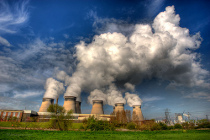Global carbon dioxide levels hit record high
The International Energy Agency (IEA) has today announced that global CO2 emissions reached a record high in 2010, making the prospect of limiting the average global temperature increase to 2ºC seem remote. In order to achieve this target, we must now limit increases in greenhouse gas emissions over the next decade to less than the amount they increased in just one year from 2009 to 2010.
 The International Energy Agency (IEA) has today announced that global CO2 emissions reached a record high in 2010, making the prospect of limiting the average global temperature increase to 2ºC seem remote.
The International Energy Agency (IEA) has today announced that global CO2 emissions reached a record high in 2010, making the prospect of limiting the average global temperature increase to 2ºC seem remote.
Following a dip in 2009, caused by the global financial crisis, emissions are estimated to have climbed to a record 30.6 gigatonnes, which represents a five per cent jump from the previous record year, 2008.
The IEA also reports that 80 per cent of projected 2020 emissions from the power sector are already “locked in”, meaning that these emissions will come from power plants that are currently already in place or under construction.
At last year’s UN climate change talks in Cancun, world leaders agreed upon a target of limiting global average temperature increases to a maximum of 2°C. For this to be achieved, the long-term concentration of greenhouse gases in the atmosphere must be limited to around 450 parts per million (CO2 equivalent), which means that global energy-related emissions in 2020 must not be greater than 32 gigatonnes. To put this target into context, this means that over the next ten years, emissions must increase less in total than they did in just one year between 2009 and 2010.
Dr Fatih Birol, Chief Economist at the IEA, had this to say about the findings: “This significant increase in CO2 emissions and the locking in of future emissions due to infrastructure investments represent a serious setback to our hopes of limiting the global rise in temperature to no more than 2ºC.”
“Our latest estimates are another wake-up call,” said Dr Birol. “The world has edged incredibly close to the level of emissions that should not be reached until 2020 if the 2ºC target is to be attained. Given the shrinking room for manoeuvre in 2020, unless bold and decisive decisions are made very soon, it will be extremely challenging to succeed in achieving this global goal agreed in Cancun.”
Speaking last week at the London School of Economics, Lord Giddens also warned of the dangers posed by rapidly increasing greenhouse gas levels: “Climate change is the most formidable problem humanity faces in the 21st Century. We’re doing something irrevocable to our planet…no other civilisation in history could have even conceived of affecting the planet this way.”
Lord Giddens went on to say: “There is a massive gap between the track we’re on now and the track we need to be on if we’re going to limit climate change – to me this is really disturbing.”
